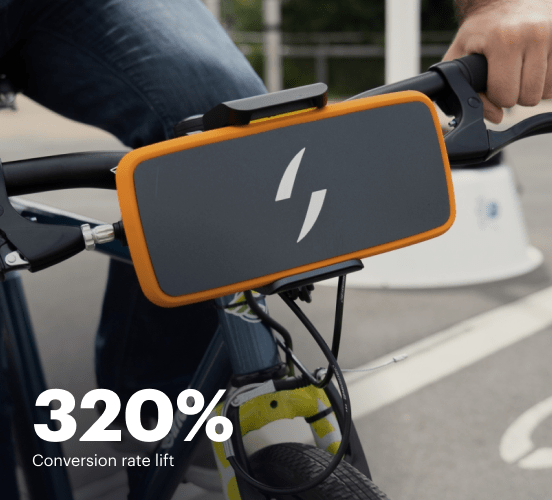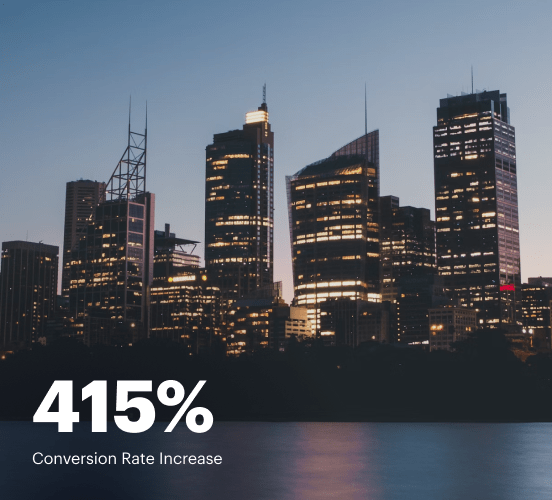How Webflow vs. Typeform vs. Instapage stack up against each other
Compare Instapage with Webflow and Typeform to create high-converting landing pages. With personalization, optimization, and collaboration tools, Instapage helps you deliver experiences that drive results.
Get startedSee how Instapage stacks up against the competition
| Feature | Instapage | Other builders |
| Drag-and-Drop Tools | ||
| Conversion-optimized templates | ||
| Manual and AI-powered A/B Tests | ||
| AI content suggestions | ||
| Popups and sticky bars | ||
| Canvas and grid blocks | ||
| Reusable and global elements | ||
| Form and popup builders | ||
| Built-in Heatmaps | ||
| Central analytics dashboard | ||
| Ad-to-page personalization and collections | ||
| Contacts, lists, and email | ||
| Dedicated, full-service CRO experts | ||
| Enterprise-ready platform |
Leading the way in building high-performing landing pages





Why Instapage is the smarter choice for your campaigns
Get everything you need to build, scale, and optimize high-converting landing pages—without coding.
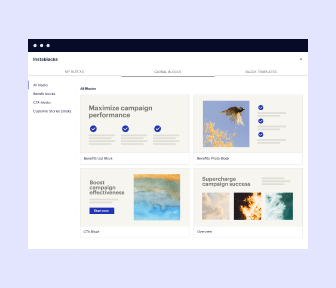
Easier page building without coding
Instapage offers a flexible and seamless page creation experience with a library of 500+ conversion-focused layouts, Instablocks®, a drag-and-drop builder, and AI content generation. With technologies like Thor Render Engine®, you can create on-brand, mobile-responsive landing pages that load quickly and start converting during initial visitor clicks.
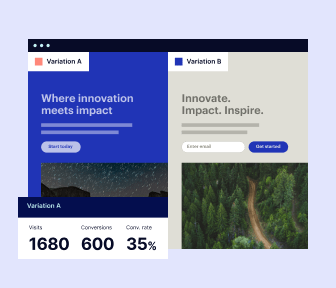
More insights — better results
Instapage lets you see in detail how each landing page experience and variation is performing so you can make targeted changes that boost page conversions. Use heatmaps for a better understanding of on-page activities, run A/B tests and AI-assisted experiments, and then track and evaluate results within robust analytics dashboards.
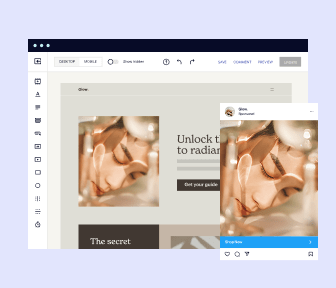
More personalized experiences
Instapage lets you quickly create high-performing landing pages tailored to each of your ad campaigns. Deliver personalized experiences for distinct audiences using dynamic text replacement. Effortlessly align specific advertisements to unique pages with AdMaps. Monitor audience-level metrics using our advanced data tools.
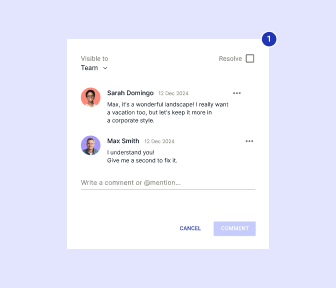
Built-in collaboration
Instapage collaboration capabilities bring your entire team together to speed up the process of landing page review, approval, and launch. No more frustrating and unnecessary revisions or edits scattered across emails. Provide instant feedback, conduct real-time page edits, and securely share your pages with outside stakeholders.
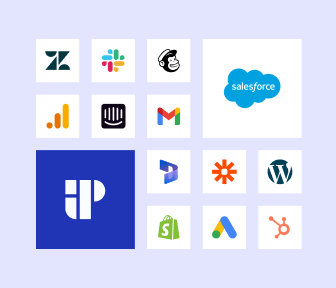
Free up time for your business
Invest time into business growth, not busy work. Launch landing pages faster with reusable forms and templates. Build once, reuse forever.
Explore all integrations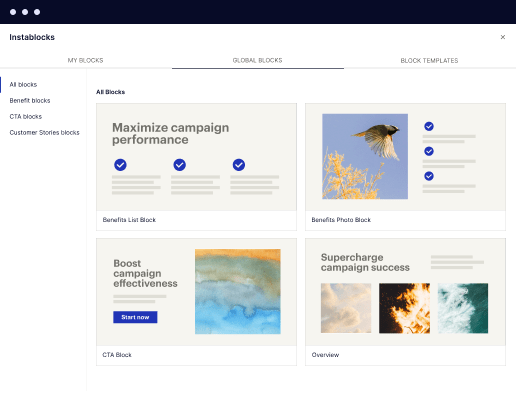
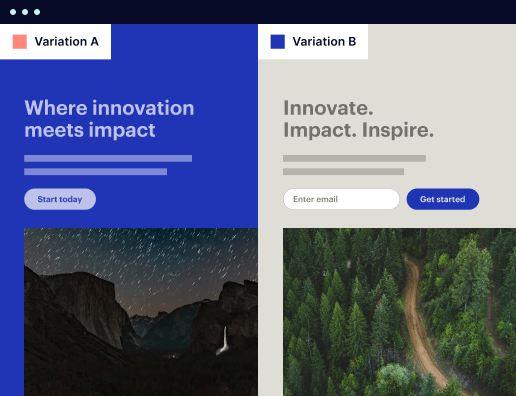
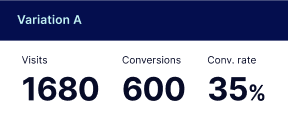
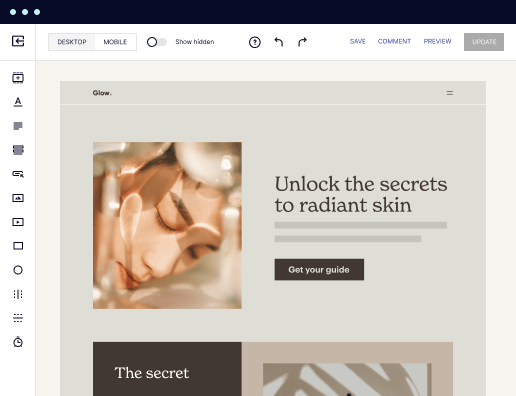

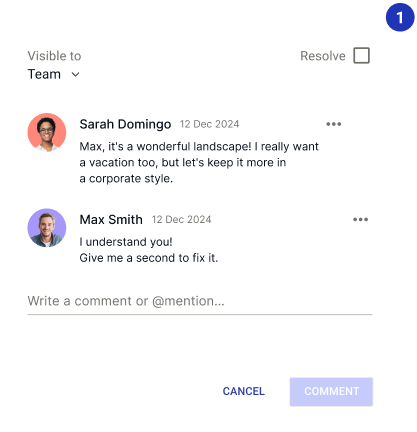
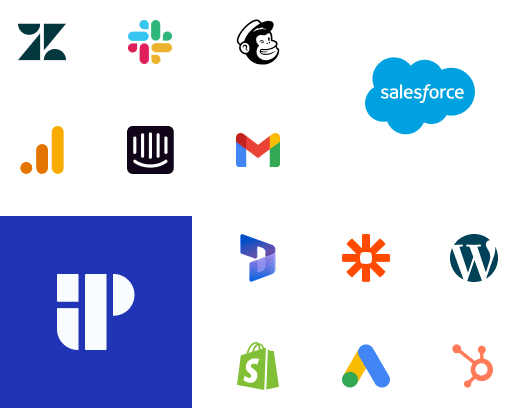
Easier page building without coding
Instapage offers a flexible and seamless page creation experience with a library of 500+ conversion-focused layouts, Instablocks®, a drag-and-drop builder, and AI content generation. With technologies like Thor Render Engine®, you can create on-brand, mobile-responsive landing pages that load quickly and start converting during initial visitor clicks.
More insights — better results
Instapage lets you see in detail how each landing page experience and variation is performing so you can make targeted changes that boost page conversions. Use heatmaps for a better understanding of on-page activities, run A/B tests and AI-assisted experiments, and then track and evaluate results within robust analytics dashboards.
More personalized experiences
Instapage lets you quickly create high-performing landing pages tailored to each of your ad campaigns. Deliver personalized experiences for distinct audiences using dynamic text replacement. Effortlessly align specific advertisements to unique pages with AdMaps. Monitor audience-level metrics using our advanced data tools.
Built-in collaboration
Instapage collaboration capabilities bring your entire team together to speed up the process of landing page review, approval, and launch. No more frustrating and unnecessary revisions or edits scattered across emails. Provide instant feedback, conduct real-time page edits, and securely share your pages with outside stakeholders.
Free up time for your business
Invest time into business growth, not busy work. Launch landing pages faster with reusable forms and templates. Build once, reuse forever.
Explore all integrationsGet started with Instapage in a few steps
-
Create your Instapage account
Start with Instapage by signing up via Google or your email. You'll get access to a free 14-day trial to discover Instapage capabilities. Feel free to cancel anytime during the 14-day trial if you decide that our product is not suitable for your business. -
Build and personalize your page
Create your first landing page from scratch or choose a template from 500+ customizable layouts. Use the drag-and-drop builder to add page elements, fonts, and backgrounds, refine content with AI, or add custom HTML, Javascript, and CSS. -
Review and make edits
Collaborate on page designs and streamline review processes. Invite your team members and stakeholders to review, edit, and provide feedback on your landing page. Collaborate knowing your page is confidential and only accessible to authorized users. -
Publish and track page performance
Publish your page to a domain or custom URL. Connect your pages to the ads you've created and track page performance within the analytics dashboard, run A/B tests and AI experiments, analyze results, and continuously optimize your landing page to maintain high conversions.
Instapage vs. Webflow vs. Typeform – The Showdown of Landing Page Builders
Imagine selecting a landing page builder as if you're assembling a highly talented team of superheroes, each with unique skills perfectly suited for a different mission. Just like every superhero has their strengths and special abilities, our contenders in the world of landing page builders—Instapage, Webflow, and Typeform—bring various attributes to the table. Instapage allows marketers to reduce costs, grow conversions, and create relevant landing page experiences; think of it as the hidden powerhouse of digital marketing. Meanwhile, Webflow showcases its design freedom to creators, and Typeform makes forms engaging and user-friendly. Throughout this article, we’ll explore which platform stands out in the ring by examining their strengths, unique features, usability, and pricing. So buckle up, because this comparison is about to get interesting!
Meet the Competitors: Heroes on the Digital Battlefield
In the left corner, we have Instapage, known for its robust conversion optimization capabilities and user-friendly interface. It empowers marketers to create landing pages that not only attract attention but also boost trust and customer loyalty through relevant experiences. In the right corner, welcoming the aesthetics of design flexibility, is Webflow, a favorite among designers who crave customization. Lastly, standing tall with interactive form-building features is Typeform, aimed at enhancing user engagement through its conversational style forms. Each contender has successfully carved a niche in the crowded marketplace—Instapage is the go-to for marketing efficiency, Webflow shines in creative control, and Typeform delivers on engaging user experiences, creating a trio of contenders ready for battle!
Round One: Feature Smorgasbord
Template Diversity and User Experience
When it comes to variety and user-friendliness, all three platforms have noteworthy attributes. Instapage boasts a multitude of customizable templates designed for conversion, making it simple for marketers to create impactful landing pages quickly. With its vast library, you can easily select a design that fits your campaign, and the drag-and-drop editor simplifies customization—perfect for marketers without tech skills. On the other hand, Webflow’s strength lies in its design flexibility; it offers several templates but allows for an unprecedented level of customization to create completely unique layouts. This makes it ideal for designers who want to showcase their creativity while still crafting a great user experience. Meanwhile, Typeform might not be a traditional landing page builder; however, its interactive forms act as engaging touchpoints that can lead effectively into landing pages, making it suitable for generating leads with higher engagement rates. The features each competitor offers directly affect user satisfaction and success metrics, affecting overall conversion rates.
Instapage: Mastering Customization and Conversion Rates
Instapage is not just another landing page builder; it’s a full-fledged marketing partner that focuses on driving conversions. Its array of customization options ensures you are never limited to a single template style, allowing for deeply personalized landing page experiences. With advanced A/B testing capabilities, marketers can fine-tune every detail—headlines, call-to-action buttons, and images—to understand what resonates most with their audience. Instapage also emphasizes seamless integration with various marketing tools, which enhances its functionality. Providing dynamic text replacement technology enables brands to deliver personalized content based on the source of traffic, enhancing the overall relevancy and trust factor. This robust set of tools empowers marketers to optimize their conversion rates continually, resulting in improved business outcomes.
Round Two: Speed and Efficiency
Speed is often the unspoken hero of user experience. Think of waiting for a website to load as standing in line for coffee—the longer the wait, the more likely you are to get frustrated. It’s crucial for landing pages to load quickly, ensuring users don’t bounce before engaging with your content. Performance impacts conversion rates significantly; therefore, the fight for speed becomes essential in evaluating each builder. This is where we dive in to unpack the speed and performance characteristics of our contenders.
Instapage Advantages:
- Extremely fast loading times due to optimized code structure
- CDN support that speeds up content delivery
- Lightweight design options that minimize the lag
- Advanced caching mechanisms resulting in quicker page renders
Webflow Advantages:
- Efficient use of code that produces quick loading times
- Strong hosting options that enhance site speed
- Critical performance monitoring and optimizations available
Typeform Advantages:
- Fast and responsive user interface for engaging forms
- Minimal load times due to efficient structure
- Adaptive design that ensures smooth performance across devices
- Integration options that help maintain performance standards
Overall, while all three builders have strengths in terms of speed, Instapage takes the crown for its unwavering commitment to fast-loading, conversion-focused pages. Quickness in loading can make all the difference in capturing user interest and sustaining engagement, and Instapage makes that a seamless part of its offering.
Round Three: Learning Curve and Ease of Use
Navigating new software can sometimes feel intimidating; however, each platform has tailored its experience to cater to both beginners and seasoned marketers. Instapage welcomes newcomers with its drag-and-drop editor, rich with intuitive tools designed to guide users through the landing page creation process. You could think of it as a user-friendly playground for marketers! Webflow, while it has a more complex interface due to its extensive customization features, has made strides in tutorials and guides, making the learning curve softer than before. Their educational resources help users become proficient in their timeline. Typeform, particularly note-worthy for its ease of creating interactive forms, employs a simple question-and-answer format, appealing to all skill levels. Just like a friendly sidekick, it guides users through building engaging forms effortlessly. Whichever platform you choose, you can rest assured that a learning pathway exists, ensuring you can achieve competence and efficiency no matter where you start from.
Round Four: Support System on All Platforms
Customer support can make or break the user experience, turning a simple issue into a complicated ordeal. Picture customer support as the loyal sidekicks to our heroes, with each platform ready to spring into action. Instapage offers robust support options, including chat, email, and a rich knowledge base that covers extensive topics. Webflow also stands out with its community forums, alongside email and chat support, as well as detailed tutorials. This resource-sharing environment enhances the user experience, helping users quickly navigate challenges. Typeform excels in customer service with prompt email responses and an active community forum, providing an arena for users to exchange tips and solve problems. Each platform clearly invests in support mechanisms that help users thrive, offering various avenues for assistance.
Final Round: Pricing Structures and Value
Pricing is often the deciding factor when selecting software, and here’s where we find different strategies at play. Instapage offers tiered pricing that resonates with marketers looking for advanced solutions that facilitate high-conversion platforms. While it may feel pricier, consider that the pricing aligns with tools designed to maximize ROI. Webflow’s pricing also reflects its design-first approach and provides flexibility suited to different user needs. Lastly, Typeform adopts a freemium model, allowing users to create forms without any direct costs while still offering premium features for those who want more options. As you evaluate which platform is the right fit for you, keep in mind how these pricing strategies align with your goals. It’s about finding the perfect balance between quality and investment that fits your business needs.
In conclusion, while all three platforms bring different strengths to the table, the ideal choice hinges on your specific marketing goals. Instapage stands out for its conversion optimization features, but Webflow and Typeform offer unique strengths in design flexibility and interactive experiences, respectively. Each platform has its unique proposition; therefore, assess which aligns most closely with your requirements. Whether you choose Instapage for its depth and marketing prowess, Webflow for creative control, or Typeform for engaging forms, you’re supported by platforms that foster growth. Dive into Instapage today to explore its features with a free trial and harness the potential for remarkable business outcomes.

